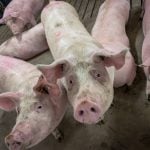This week, the House of Commons agriculture committee will report that an audit of slaughter plant books in the aftermath of the BSE outbreak showed a sharp spike in packer profits but no obvious collusion or inappropriate gouging.
Last week, the committee heard the last in-camera report from auditors who have been poring over company books since they were demanded by the committee and finally turned over to Parliament in the fall.
MPs did not see the books; instead they heard analysis from federal auditors.
Read Also

Storm dynamics and extreme rainfall
Besides moisture, instability and orographic lift, the next biggest factor that contributes to heavy or extreme rainfall is storm dynamics.
“From what we have seen, packers certainly made money but in part it was the design of the program, the need for a death certificate before federal money would be paid, so there was a surplus of cattle in the pipeline and prices collapsed,” said one Parliament Hill source familiar with the auditor’s report.
“The report to the House of Commons will reflect that. And in fact, profits weren’t as high as many have assumed.”
Tabling the report in the Commons will bring to an end a tumultuous episode that saw some packers defy what they considered a hostile committee of politicians, a finding that the packers were in contempt of Parliament and the threat for the first time in almost a century of fines or jail terms if companies did not hand over the books to Parliament.
In the end, the dispute will end with a whimper rather than a bang.
Last week, Canadian Meat Council president Brian Read, president of Montreal’s Levinoff Meat Products Ltd., said he had no advance knowledge of the committee report but expected a finding of higher profits but nothing inappropriate. He said the federal Competition Bureau is also investigating the industry.
“We have been honest and up front and we have nothing to hide,” he said.
Yet Read also said the nasty confrontation with politicians, as well as cattle producer and public anger over packer profits while producers suffered, showed the packing industry was not well prepared for the political fallout.
“We feel it was a sham, a bit, but it is a lesson learned about the democratic process,” he said in a Feb. 4 interview during the Canadian Meat Council annual meeting.
“Maybe we as an industry were not as prepared as we should have been going before the standing committee.”
He also conceded that while packers kept in close touch with cattle industry leaders, it did not do as good a job keeping in touch with producers.
“Our supply base has been somewhat alienated,” he said.
“We did say through the process we were making money but everybody forgot that in the first six months we were standing still but we continued to employ our people. We (Levinoff) were losing $400,000 a week just in pay. We never got recognized for that and that confused us.”
Kevin Grier, a beef market analyst with the George Morris Centre in Guelph, Ont., said it would be astounding if the study did not show the packers have done well through the industry crisis because of market forces Ñ an oversupply of cattle unable to cross the American border leading to low cattle prices and a continued strong demand for beef products leading to high sales prices.
Grier considered the Commons agriculture probe a political exercise that sought culprits rather than rational market answers. He had a testy meeting with MPs last year as he tried to argue high packer profits were just the results of a rational market at work.
Last week, he got a measure of revenge when he told the meat council that his appearance before the Commons committee was the highlight of his year.
“For the first time in my life, I was the most intelligent and ethical person in the room.”














